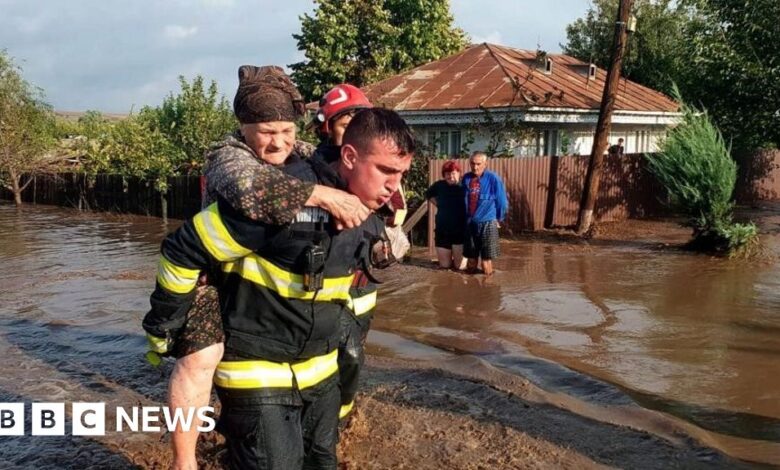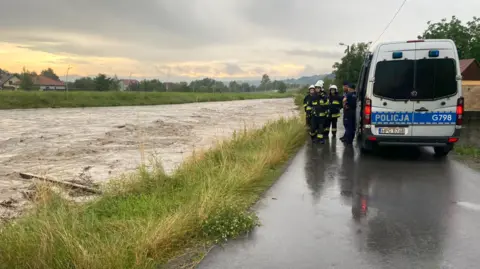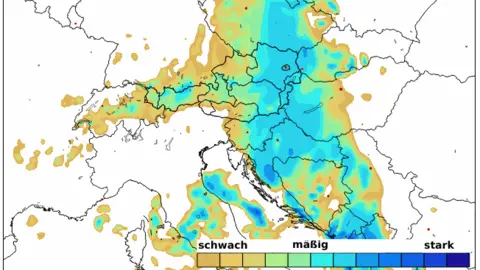Fears of death toll continue to rise as heavy rains continue

Romania has set up evacuation camps and launched rescue operations after floods killed at least four people and destroyed thousands of homes in the east of the country.
Boats and military aircraft are being used to move people to safety, and Prime Minister Marcel Ciolacu said the priority now was to prevent further casualties.
Torrential rain has lashed central and eastern Europe in recent days, causing river levels to rise and triggering flood warnings in the Czech Republic, Poland, Austria, Slovakia and Hungary.
Flood barriers in the Czech capital Prague have been raised, while people in some areas of Poland have been evacuated.
Four people were found dead in the Galati region of southeastern Romania during a search and rescue operation, emergency services confirmed to AFP news agency.
“Dozens of people have been rescued from their homes in 19 areas across the country,” they added.
 Polish Police
Polish PoliceIN PolandInterior Minister Tomasz Siemoniak said there was a “difficult situation” in areas around the four rivers.
In the southwest, the Biala River has exceeded the two-metre safety mark and there is particular concern for the nearby towns of Morow and Glucholazy.
Glucholazy resident Piotr Jakubiec said he had prepared sandbags and pumps to divert the water but “could not predict what would happen”.
“This is the second time in my life I have witnessed such a phenomenon. This is really a nightmare for the people living here,” he said.
Another resident, Zofia Owsiaka, said everyone in the town was “scared” and there seemed “no hope the rain will stop”.
“Of course I was scared. Water is the greatest force of nature. Everyone is scared,” she said.
In the town of Wroclaw, thousands of residents had to use the stairs of high-rise buildings because elevators were closed due to flooding fears, local media reported.
Prime Minister Donald Tusk has tried to reassure the public that the forecasts are “not too alarming” and the threat is not widespread across the country.
 MARTIN DIVISEK/EPA-EFE/REX/Shutterstock
MARTIN DIVISEK/EPA-EFE/REX/ShutterstockIn Czech RepublicThe highest flood warning has been issued in 38 different locations.
In Prague, flood barriers were raised, embankments were closed to the public and the zoo was closed.
On Friday morning, a meter-thick steel gate was used to close off the so-called Devil’s Channel or Certificationrun through the city
The gate is part of a nationwide flood defence network installed to prevent a repeat of the catastrophic damage caused by floods in 1997 and 2002.
This weekend, all eyes are on the central and eastern regions of the country, especially North Moravia, where 50 people died in 1997.
The Jeseniky Mountains could receive around 400mm over the next three days and that water will then flow down the Oder River (Odra (in Czech) and continues towards Poland, passing through several towns and villages along the way.
 GeoSphere Austria
GeoSphere AustriaIN ShirtIn what officials say is the hottest August on record, many areas are expected to see 10-20cm of rain in a few days. In some northern areas, more than 20cm is forecast.
The UWZ storm warning centre said some areas would see previous records for the entire month of September “broken in just a few days”.
“What we are experiencing is extraordinary, if not unprecedented,” said Manuel Kelemen, weather forecaster for Puls24 TV channel.
Flooding and landslides are also possible, with strong winds expected to hit the capital Vienna, and heavy snowfall in the west also causing transport disruption.
Continuous heavy rain is also expected on the border in the German state Bavaria.
Extreme rainfall is becoming more common in Europe and many other parts of the world due to climate change.
Warmer air can hold more moisture, leading to heavier rainfall.





